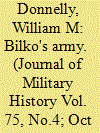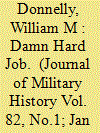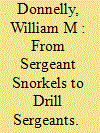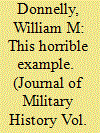| Srl | Item |
| 1 |
ID:
116800


|
|
|
|
|
| Publication |
2011.
|
| Summary/Abstract |
A major criticism of the U.S. Army during the Vietnam War is that it suffered from a crisis in command, especially among officers above the company grade level. Most writing on this topic has centered on structural issues, such as post-World War II personnel policies. This article will examine this phenomenon between the Korean and Vietnam wars by comparing contemporary publications and retrospective critiques by veterans with internal Army sources, particularly service schools, the headquarters of the Continental Army Command, and Headquarters, Department of the Army. If a crisis in command existed between 1953 and 1965, did these organizations' leaders recognize it and address it?
|
|
|
|
|
|
|
|
|
|
|
|
|
|
|
|
| 2 |
ID:
159434


|
|
|
|
|
| Summary/Abstract |
James A. Van Fleet believed that units possessing the will to win would always emerge victorious from any battle. From July 1951 to the end of his tenure as Eighth Army’s commander in Korea in February 1953, he would find that his mission of holding the line until an armistice made it difficult to maintain a will to win among U.S. Army infantrymen. Also working against him were factors arising from the Army’s manpower crisis and the tactical problems facing his infantrymen on the battlefield. Under these conditions Van Fleet was unable to keep these units “fit, ready, and eager to fight.”
|
|
|
|
|
|
|
|
|
|
|
|
|
|
|
|
| 3 |
ID:
187238


|
|
|
|
|
| Summary/Abstract |
During the ten years following the armistice in Korea, the U.S. Army described its basic training for enlisted male soldiers as a process that transformed civilians into men tough enough to withstand the rigors of a war with the Soviet Union. There was, however, during these years great dissatisfaction with this program. Critics both inside and outside the service found a variety of faults, but the one most frequently cited was the quality of officers and sergeants assigned to shepherd recruits through the transition from civilian to soldier. Despite frequently praising the drill instructor concept used in Marine Corps basic training, senior army officers refused to adapt it for use in their service’s training centers. Effective change, in the form of the drill sergeant program, would come only after intervention into a core military function by Cyrus R. Vance and Stephen Ailes, successive secretaries of the army.
|
|
|
|
|
|
|
|
|
|
|
|
|
|
|
|
| 4 |
ID:
138444


|
|
|
|
|
| Summary/Abstract |
The decision in 1965 to expand the U.S. Army's active force without a reserve mobilization quickly generated massive organizational turbulence. In this environment one unwilling soldier found an extraordinary opportunity to slip away.
|
|
|
|
|
|
|
|
|
|
|
|
|
|
|
|